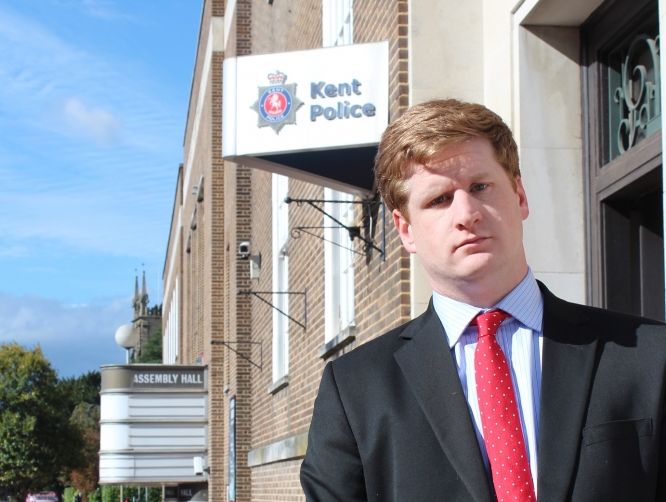The Times invited comment on the issue from the Chief Constable of Kent and the Police and Crime Commissioner for the county. Their comments are published unedited below. We shared those views with Tunbridge Wells Soroptimists and the Tunbridge Wells Labour Women’s Forum. Their comments also appear below…
Matthew Scott, the Police and Crime Commissioner for Kent:
Sarah’s family and friends have been through the most painful and tragic ordeal. I cannot begin to imagine their grief after hearing their statement.
Sarah was just walking home. Sarah had every right to be safe. But tragically, she wasn’t. And so many others are telling us that they feel unsafe too. We owe it to her, and every other victim and survivor, to do better.
This is more than just ‘learning the lessons’. This requires a systematic response. Not finger pointing. It is not just his appalling crimes. It is his recruitment, the conduct he is supposed to have demonstrated before and the crimes that he is alleged to have committed.
It is the toxic WhatsApp groups that seem to exist everywhere now, and the poor workplace culture where he can be given awful nicknames based on how he made women feel.
Everyone, including Police Officers and Staff, are rightly disgusted by him and that he ever held the badge. Terrible people exist in every profession. But few hold the power and trust that the Police have.
There aren’t just questions to be answered but changes to be made. We are already looking at what we can do locally. And we owe it to everyone that we act and deliver.
Chief Constable of Kent Police Alan Pughsley’s full statement on Wayne Couzens:
Much like the general public, police forces and officers up and down the country are shocked and saddened by the actions of Wayne Couzens.
We also understand that as a result of the way he treated Sarah Everard there may be concerns amongst the public, particularly amongst women and girls, about being approached by police officers or knowing how best to verify their identity and the reasons for being stopped.
I want to make it absolutely clear that Kent Police officers will always carry identification and can always be asked for verification as part of their duties.
My officers serve this county with a great deal of pride and passion and they, like the public, will understand now more than ever why those we engage with may want more reassurance about the work we do.
But I would add that Couzens is not representative of police officers in Kent, or indeed the country – he betrayed the very thing we take an oath to do and that is to protect life.
I hope in time the public will realise he is the exception, not the rule, and in the meantime our thoughts are very much with those who knew Sarah.”
Response by Carol Wilson, Women’s Labour Forum, Tunbridge Wells:
The suggestion by police and some ministers that he was a single rotten apple becomes increasingly untenable since so much more information has come to light including Wayne Couzens’ exchange of misogynistic, racist, homophobic material shared with other officers on a Metropolitan Police WhatsApp Group and according to colleagues his interest in extreme pornography and his inappropriate behaviour with women colleagues.
His time in Kent policing is also not without question as a previous indecent exposure incident in 2015 was not followed up and went unreported in his transfer and vetting to the Metropolitan Police in 2018.
Sarah Everard was the 16th woman to be killed by a serving or former police officer since 2009. Over 800 allegations of domestic abuse have been made against officers and staff over the past five years of which only 43 were prosecuted. Even today we have yet another serving Met officer charged with rape. One rotten apple, I think not. We badly need Institutional cultural change.
The message from women is loud and clear. We need to see the government compel the police to act. It is significant that Sarah was killed by a serving police officer and change must start there.
Response by Caroline Auckland, President, Soroptimist Tunbridge Wells:
It is worrying to read the reference to WhatsApp communications in Matthew Scott’s statement, knowing that policemen in current service were engaging in communication with Couzens on this channel and yet none of them felt sufficiently alarmed enough to do anything about it at the time.
The Chief Constable of Kent Police highlights the use of ‘identification cards being used as verifications as part of their duties’ – sadly this is not helpful since both Couzens and the newly reported rape case references the men in question using their police ID cards to assist them in their crimes.
How does any of this build trust in our society and what is the way forward? Women should be involved in decision-taking not just at survey level but in all levels of planning in terms of the public arena. Also we would call for there to be more female police officers in general and a greater presence of police, in groups, on our streets especially at night.
A whole new policing strategy needs to be in put in place where safety concerns are immediately addressed. This is a conversation that has been going on for too long, most of it one way, we need education about gender-based violence in all public sector areas and education establishments, to raise awareness and advocate for changes in policy. Violence against women is a crime.








